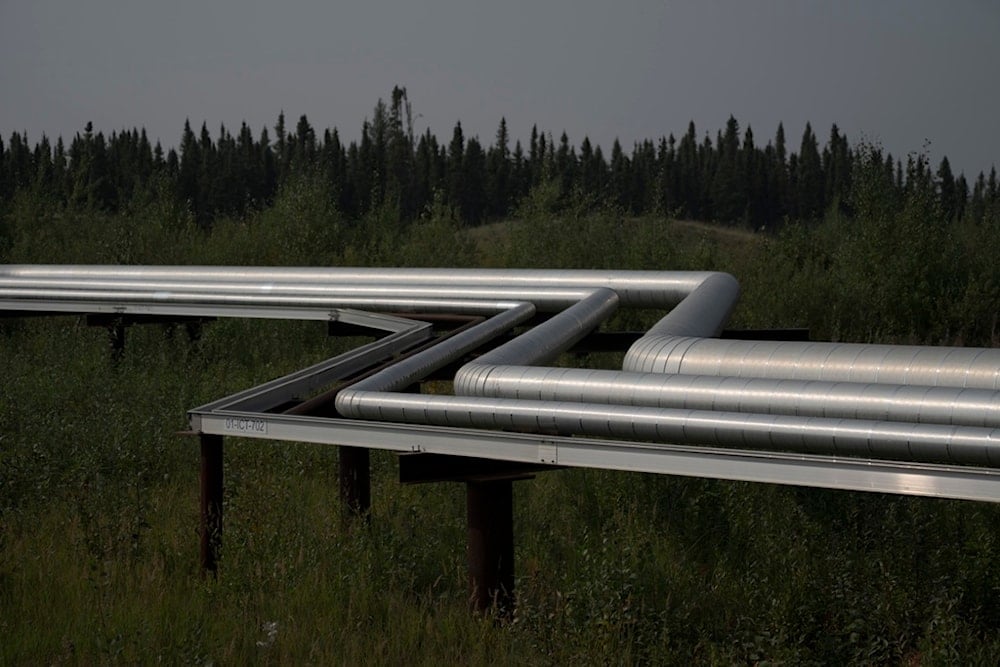Canada's December inflation hits 3.4% due to gasoline prices
With the so-called "headline" inflation figure standing at 3.4 percent, this economic indicator remains above the Bank of Canada's target of two percent.
-

Tubing transporting gas, steam and oil emulsion stand above the vegetation to allow for animals to pass underneath at Cenovus' Sunrise oil facility northeast of Fort McMurray on Aug. 31, 2023 (AP)
Data released by Statistics Canada on Tuesday revealed that during the month of December, Canada's annual inflation rate increased to 3.4 percent.
This follows two consecutive months, October and November, where inflation remained constant at 3.1 percent year-over-year.
The increase in December was attributed to rising prices in gasoline, air travel, passenger vehicles, and rent, as indicated by StatsCan.
Additionally, food prices in stores experienced a 4.7 percent increase compared to the previous year, mirroring the same rate of growth observed in November.
Chief economist Doug Porter of the Bank of Montreal remarked that the recent consumer price index measurements were not unexpected.
"That's a big improvement from where we were a year ago," he said. "But it's still just a little bit too high for comfort."
Porter observed a potential reduction in Canadians' expenditures on what he referred to as "discretionary spending." Notably, there has been a decline in activities such as travel tours and certain recreational categories.
"We're seeing a little bit of underlying softness. People are still willing to spend there, but just not nearly as to the same extent as they might have a year or two ago," said Porter.
Gasoline prices over the roof
In its publication, the federal statistics agency highlighted that the headline inflation figure of 3.4 percent was "largely the result of higher year-over-year prices for gasoline in December."
While StatsCan indicates that gasoline prices actually decreased in December 2023 compared to the previous month, it's important to note that in December 2022, gasoline prices had fallen even more in comparison.
This phenomenon is referred to as the "base-year effect," where comparing present figures to those of the previous year can reveal a more pronounced difference.
Read more: Germany paying 2.5 times more for Gas in 2023 compared to 2021
It's partly due to this effect that many economists anticipated inflation figures similar to the ones disclosed today.
If gasoline prices were excluded from the calculation, Statistics Canada mentioned that the consumer price index for December would surpass today's headline number, reaching 3.5 percent.
However, it's noteworthy that inflation minus gasoline in December was lower than inflation minus gasoline in November.
Central bank target out of reach
With the so-called "headline" inflation figure standing at 3.4 percent, this economic indicator remains above the Bank of Canada's target of two percent. In response to persistently high inflation rates, the central bank has implemented 10 interest rate hikes since early 2022. Although a slowdown in inflation prompted Bank of Canada governor Tiff Macklem to maintain rates at five percent for the past few months, numerous economists anticipate a potential rate cut in 2024.
Addressing this possibility in late 2023, Macklem stated that it was premature to determine if or when a rate cut might occur. "I know it's tempting to rush ahead to that discussion. But it's still too early to consider cutting our policy rate," he remarked in December.
Bank of Montreal has expressed the view that the inflation data from December 2023 still indicates the likelihood of interest rate cuts in mid-2024. On the other hand, CIBC predicts that the central bank will require "more progress" on certain inflationary factors before contemplating a reduction in interest rates.
Doug Porter, commenting on the latest inflation rates, mentioned, "It's really not quite there yet for where the Bank of Canada would like to see it. They are worried that inflation pressures might just be smoldering at this point. It wouldn't really take that much to ignite them again."
The release of inflation data coincides with a recent Bank of Canada survey indicating a growing trend among Canadians to cut back on spending.
However, mortgage holders appear confident in their ability to manage higher payments when their loans renew, according to the central bank's fourth-quarter consumer expectations and business outlook surveys, where approximately two-thirds of Canadians cited reducing or planning to reduce spending due to expectations related to interest rates and inflation.

 4 Min Read
4 Min Read








